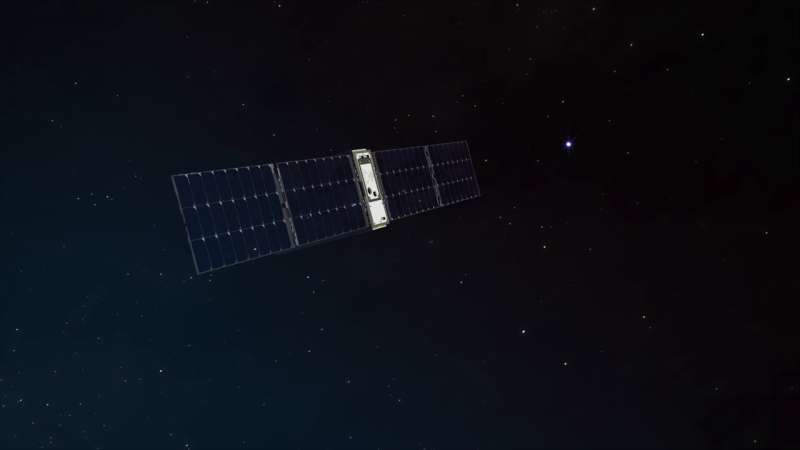Venus' Clouds Could Harbor Life: MIT Study Finds Amino Acids Stable in Sulfuric Acid
Friday, 22 March 2024 21:39 If there is life in the solar system beyond Earth, it might be found in the clouds of Venus. In contrast to the planet's blisteringly inhospitable surface, Venus' cloud layer, which extends from 30 to 40 miles above the surface, hosts milder temperatures that could support some extreme forms of life.
If it's out there, scientists have assumed that any Venusian cloud inhabitant would look v
If there is life in the solar system beyond Earth, it might be found in the clouds of Venus. In contrast to the planet's blisteringly inhospitable surface, Venus' cloud layer, which extends from 30 to 40 miles above the surface, hosts milder temperatures that could support some extreme forms of life.
If it's out there, scientists have assumed that any Venusian cloud inhabitant would look v Unveiling hydrogen's role in life's early energy mechanisms
Friday, 22 March 2024 21:39 A study reveals that hydrogen gas, known as a modern clean fuel, was also a fundamental energy source at the dawn of life nearly 4 billion years ago. This discovery underscores hydrogen's longstanding significance in both ancient biological processes and its potential in future sustainable energy solutions.
Hydrothermal vents, releasing hydrogen in the deep sea, provided the early Earth's
A study reveals that hydrogen gas, known as a modern clean fuel, was also a fundamental energy source at the dawn of life nearly 4 billion years ago. This discovery underscores hydrogen's longstanding significance in both ancient biological processes and its potential in future sustainable energy solutions.
Hydrothermal vents, releasing hydrogen in the deep sea, provided the early Earth's Hanwha Phasor introduces next-gen satellite antenna for enhanced global communication
Friday, 22 March 2024 21:39 Hanwha Phasor, a satellite communications innovator based in the UK, has announced the upcoming release of its new land-based antenna, the Phasor L3300B, set to hit the market in Q3 of 2024. Engineered for both commercial and military applications, the Phasor L3300B represents a significant advancement in active electronically steered antenna (AESA) technology.
This launch signifies the de
Hanwha Phasor, a satellite communications innovator based in the UK, has announced the upcoming release of its new land-based antenna, the Phasor L3300B, set to hit the market in Q3 of 2024. Engineered for both commercial and military applications, the Phasor L3300B represents a significant advancement in active electronically steered antenna (AESA) technology.
This launch signifies the de Space-Born Muscle Monitoring Technology Promises Earthly Healthcare Advancements
Friday, 22 March 2024 21:39 For the first time, astronauts can monitor their muscle health during space missions thanks to a new handheld device, revealing the muscle groups most vulnerable in low-gravity environments.
A collaborative effort involving the University of Southampton and spearheaded by Charite University in Berlin enabled a team of researchers to observe the muscle condition of twelve astronauts before,
For the first time, astronauts can monitor their muscle health during space missions thanks to a new handheld device, revealing the muscle groups most vulnerable in low-gravity environments.
A collaborative effort involving the University of Southampton and spearheaded by Charite University in Berlin enabled a team of researchers to observe the muscle condition of twelve astronauts before, Antaris and SpeQtral Unveil Quantum Encryption Satellite Collaboration
Friday, 22 March 2024 21:39 In a significant move for secure global communications, Antaris, a supplier of military space mission software, has teamed up with SpeQtral, specialists in quantum key distribution (QKD), to manufacture and deploy satellites equipped with quantum-safe key distribution technology for both government and commercial use. The collaboration includes merging SpeQtral's cutting-edge quantum payloads wi
In a significant move for secure global communications, Antaris, a supplier of military space mission software, has teamed up with SpeQtral, specialists in quantum key distribution (QKD), to manufacture and deploy satellites equipped with quantum-safe key distribution technology for both government and commercial use. The collaboration includes merging SpeQtral's cutting-edge quantum payloads wi General Atomics Partners with Lockheed Martin for Next-Gen Missile Tracking Satellites
Friday, 22 March 2024 21:39GomSpace and SAIC Advance Their Satellite Collaboration with New Development Phase
Friday, 22 March 2024 21:39 GomSpace North America, in a significant advancement of their ongoing partnership with SAIC, a leading $7 billion Federal contractor based in Reston, Virginia, has embarked on a new phase. Initially forging a strategic alliance in 2023, SAIC has now acquired a satellite kit from GomSpace. This kit will be the cornerstone of a specialized satellite project spearheaded at SAIC's space development
GomSpace North America, in a significant advancement of their ongoing partnership with SAIC, a leading $7 billion Federal contractor based in Reston, Virginia, has embarked on a new phase. Initially forging a strategic alliance in 2023, SAIC has now acquired a satellite kit from GomSpace. This kit will be the cornerstone of a specialized satellite project spearheaded at SAIC's space development Spire Global and NVIDIA Forge Partnership to Revolutionize AI-Based Weather Forecasting
Friday, 22 March 2024 21:39 Spire Global, Inc. (NYSE: SPIR) has entered into a strategic partnership with NVIDIA to push the boundaries of AI in weather forecasting. This collaboration will see the integration of Spire's Radio Occultation (RO) data and unique data assimilation (DA) capabilities with NVIDIA's Earth-2 Cloud APIs. The objective is to employ artificial intelligence to enhance the speed and accuracy of climate
Spire Global, Inc. (NYSE: SPIR) has entered into a strategic partnership with NVIDIA to push the boundaries of AI in weather forecasting. This collaboration will see the integration of Spire's Radio Occultation (RO) data and unique data assimilation (DA) capabilities with NVIDIA's Earth-2 Cloud APIs. The objective is to employ artificial intelligence to enhance the speed and accuracy of climate Yale Scientists Uncover Earth's Hidden Bioelectric System
Friday, 22 March 2024 21:39 In a landmark study, researchers at Yale University and NOVA School of Science and Technology, NOVA University Lisbon (NOVA-FCT), have unveiled how subterranean bacteria thrive in oxygen-deprived environments by harnessing a specialized family of proteins. These proteins enable the bacteria to offload excess electrons onto tiny hair-like structures known as nanowires, creating an intricate, natu
In a landmark study, researchers at Yale University and NOVA School of Science and Technology, NOVA University Lisbon (NOVA-FCT), have unveiled how subterranean bacteria thrive in oxygen-deprived environments by harnessing a specialized family of proteins. These proteins enable the bacteria to offload excess electrons onto tiny hair-like structures known as nanowires, creating an intricate, natu Setting a laser like sight on a path to practical fusion
Friday, 22 March 2024 21:39 In the quest for a sustainable and productive energy future, scientists have long eyed nuclear fusion, specifically the fusion of hydrogen nuclei, as a prime candidate. The main challenge, however, has been the daunting requirement of extremely high pressures and temperatures to initiate the process.
The Helmholtz-Zentrum Dresden-Rossendorf's Dr. Tobias Dornheim, through the "X-ray laser o
In the quest for a sustainable and productive energy future, scientists have long eyed nuclear fusion, specifically the fusion of hydrogen nuclei, as a prime candidate. The main challenge, however, has been the daunting requirement of extremely high pressures and temperatures to initiate the process.
The Helmholtz-Zentrum Dresden-Rossendorf's Dr. Tobias Dornheim, through the "X-ray laser o AT&T underlines support for realizing direct-to-smartphone satellite service
Friday, 22 March 2024 21:04

NASA and Boeing prepare for Starliner crewed test flight in May
Friday, 22 March 2024 20:22

NASA's tiny BurstCube mission launches to study cosmic blasts
Friday, 22 March 2024 15:59

NASA's BurstCube, a shoebox-sized satellite designed to study the universe's most powerful explosions, is on its way to the International Space Station.
The spacecraft travels aboard SpaceX's 30th Commercial Resupply Services mission, which lifted off at 4:55 p.m. EDT on Thursday, March 21, from Launch Complex 40 at Cape Canaveral Space Force Station in Florida. After arriving at the station, BurstCube will be unpacked and later released into orbit, where it will detect, locate, and study short gamma-ray bursts—brief flashes of high-energy light.
"BurstCube may be small, but in addition to investigating these extreme events, it's testing new technology and providing important experience for early career astronomers and aerospace engineers," said Jeremy Perkins, BurstCube's principal investigator at NASA's Goddard Space Flight Center in Greenbelt, Maryland.
The unexplained: Giant Swedish archive logs paranormal phenomena
Friday, 22 March 2024 13:56
Newspaper clippings, books and first-hand accounts of people who said they visited other planets are catalogued in a giant Swedish archive on paranormal phenomena, attracting the curious and researchers from around the world.
The Archives for the Unexplained (AFU) claims to be the world's biggest library of paranormal phenomena, with 4.2 kilometers (2.6 miles) of shelves running underground.
Clas Svahn, 65, and Anders Liljegren, 73, who run the archive located in the southeastern town of Norrkoping, say they are neither superstitious nor believers, but rather "curious investigators of the unknown".
The AFU—the name of both the library and the association that has collected documentation for more than 50 years—is mainly comprised of books, but also more original documents, such as first-hand accounts of paranormal activity recorded on tape and photos of ghosts.
"What we are building here at AFU is depository knowledge," explains Svahn, showing AFP journalists around the 700-square-metre (7,535-square-foot) library.
"We're trying to get as much as we can on... every kind of unsolved scientific mystery that we can find... to make this available for the world."
The library receives around 300 visits each year, by appointment only.



